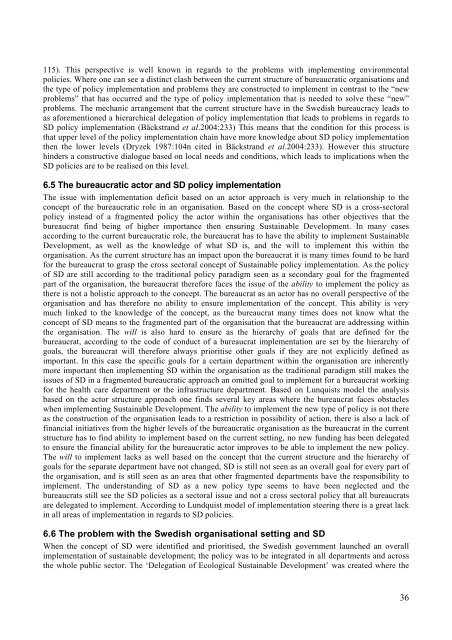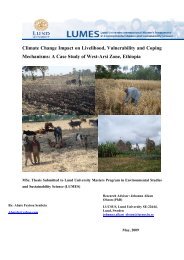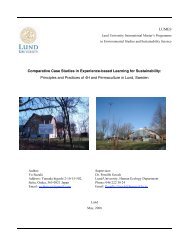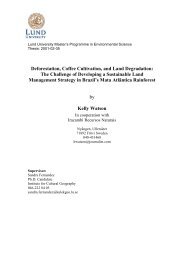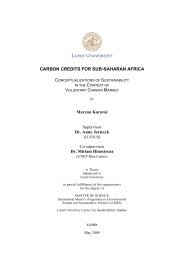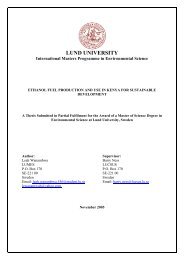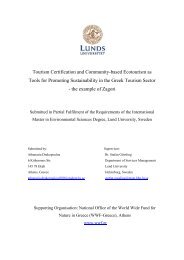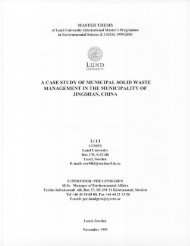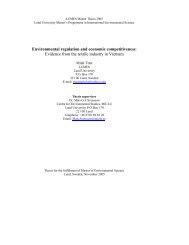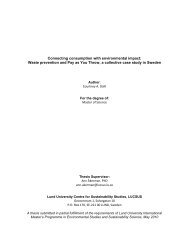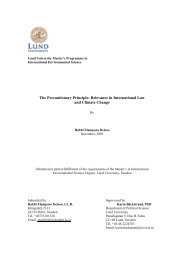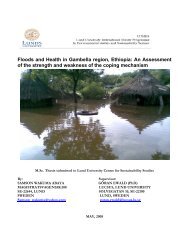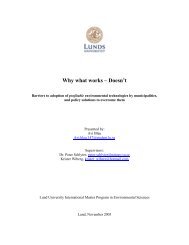From 'grey to green'- investigating the capabilities of the ... - lumes
From 'grey to green'- investigating the capabilities of the ... - lumes
From 'grey to green'- investigating the capabilities of the ... - lumes
Create successful ePaper yourself
Turn your PDF publications into a flip-book with our unique Google optimized e-Paper software.
115). This perspective is well known in regards <strong>to</strong> <strong>the</strong> problems with implementing environmentalpolicies. Where one can see a distinct clash between <strong>the</strong> current structure <strong>of</strong> bureaucratic organisations and<strong>the</strong> type <strong>of</strong> policy implementation and problems <strong>the</strong>y are constructed <strong>to</strong> implement in contrast <strong>to</strong> <strong>the</strong> “newproblems” that has occurred and <strong>the</strong> type <strong>of</strong> policy implementation that is needed <strong>to</strong> solve <strong>the</strong>se “new”problems. The mechanic arrangement that <strong>the</strong> current structure have in <strong>the</strong> Swedish bureaucracy leads <strong>to</strong>as aforementioned a hierarchical delegation <strong>of</strong> policy implementation that leads <strong>to</strong> problems in regards <strong>to</strong>SD policy implementation (Bäckstrand et al.2004:233) This means that <strong>the</strong> condition for this process isthat upper level <strong>of</strong> <strong>the</strong> policy implementation chain have more knowledge about SD policy implementation<strong>the</strong>n <strong>the</strong> lower levels (Dryzek 1987:104n cited in Bäckstrand et al.2004:233). However this structurehinders a constructive dialogue based on local needs and conditions, which leads <strong>to</strong> implications when <strong>the</strong>SD policies are <strong>to</strong> be realised on this level.6.5 The bureaucratic ac<strong>to</strong>r and SD policy implementationThe issue with implementation deficit based on an ac<strong>to</strong>r approach is very much in relationship <strong>to</strong> <strong>the</strong>concept <strong>of</strong> <strong>the</strong> bureaucratic role in an organisation. Based on <strong>the</strong> concept where SD is a cross-sec<strong>to</strong>ralpolicy instead <strong>of</strong> a fragmented policy <strong>the</strong> ac<strong>to</strong>r within <strong>the</strong> organisations has o<strong>the</strong>r objectives that <strong>the</strong>bureaucrat find being <strong>of</strong> higher importance <strong>the</strong>n ensuring Sustainable Development. In many casesaccording <strong>to</strong> <strong>the</strong> current bureaucratic role, <strong>the</strong> bureaucrat has <strong>to</strong> have <strong>the</strong> ability <strong>to</strong> implement SustainableDevelopment, as well as <strong>the</strong> knowledge <strong>of</strong> what SD is, and <strong>the</strong> will <strong>to</strong> implement this within <strong>the</strong>organisation. As <strong>the</strong> current structure has an impact upon <strong>the</strong> bureaucrat it is many times found <strong>to</strong> be hardfor <strong>the</strong> bureaucrat <strong>to</strong> grasp <strong>the</strong> cross sec<strong>to</strong>ral concept <strong>of</strong> Sustainable policy implementation. As <strong>the</strong> policy<strong>of</strong> SD are still according <strong>to</strong> <strong>the</strong> traditional policy paradigm seen as a secondary goal for <strong>the</strong> fragmentedpart <strong>of</strong> <strong>the</strong> organisation, <strong>the</strong> bureaucrat <strong>the</strong>refore faces <strong>the</strong> issue <strong>of</strong> <strong>the</strong> ability <strong>to</strong> implement <strong>the</strong> policy as<strong>the</strong>re is not a holistic approach <strong>to</strong> <strong>the</strong> concept. The bureaucrat as an ac<strong>to</strong>r has no overall perspective <strong>of</strong> <strong>the</strong>organisation and has <strong>the</strong>refore no ability <strong>to</strong> ensure implementation <strong>of</strong> <strong>the</strong> concept. This ability is verymuch linked <strong>to</strong> <strong>the</strong> knowledge <strong>of</strong> <strong>the</strong> concept, as <strong>the</strong> bureaucrat many times does not know what <strong>the</strong>concept <strong>of</strong> SD means <strong>to</strong> <strong>the</strong> fragmented part <strong>of</strong> <strong>the</strong> organisation that <strong>the</strong> bureaucrat are addressing within<strong>the</strong> organisation. The will is also hard <strong>to</strong> ensure as <strong>the</strong> hierarchy <strong>of</strong> goals that are defined for <strong>the</strong>bureaucrat, according <strong>to</strong> <strong>the</strong> code <strong>of</strong> conduct <strong>of</strong> a bureaucrat implementation are set by <strong>the</strong> hierarchy <strong>of</strong>goals, <strong>the</strong> bureaucrat will <strong>the</strong>refore always prioritise o<strong>the</strong>r goals if <strong>the</strong>y are not explicitly defined asimportant. In this case <strong>the</strong> specific goals for a certain department within <strong>the</strong> organisation are inherentlymore important <strong>the</strong>n implementing SD within <strong>the</strong> organisation as <strong>the</strong> traditional paradigm still makes <strong>the</strong>issues <strong>of</strong> SD in a fragmented bureaucratic approach an omitted goal <strong>to</strong> implement for a bureaucrat workingfor <strong>the</strong> health care department or <strong>the</strong> infrastructure department. Based on Lunquists model <strong>the</strong> analysisbased on <strong>the</strong> ac<strong>to</strong>r structure approach one finds several key areas where <strong>the</strong> bureaucrat faces obstacleswhen implementing Sustainable Development. The ability <strong>to</strong> implement <strong>the</strong> new type <strong>of</strong> policy is not <strong>the</strong>reas <strong>the</strong> construction <strong>of</strong> <strong>the</strong> organisation leads <strong>to</strong> a restriction in possibility <strong>of</strong> action, <strong>the</strong>re is also a lack <strong>of</strong>financial initiatives from <strong>the</strong> higher levels <strong>of</strong> <strong>the</strong> bureaucratic organisation as <strong>the</strong> bureaucrat in <strong>the</strong> currentstructure has <strong>to</strong> find ability <strong>to</strong> implement based on <strong>the</strong> current setting, no new funding has been delegated<strong>to</strong> ensure <strong>the</strong> financial ability for <strong>the</strong> bureaucratic ac<strong>to</strong>r improves <strong>to</strong> be able <strong>to</strong> implement <strong>the</strong> new policy.The will <strong>to</strong> implement lacks as well based on <strong>the</strong> concept that <strong>the</strong> current structure and <strong>the</strong> hierarchy <strong>of</strong>goals for <strong>the</strong> separate department have not changed, SD is still not seen as an overall goal for every part <strong>of</strong><strong>the</strong> organisation, and is still seen as an area that o<strong>the</strong>r fragmented departments have <strong>the</strong> responsibility <strong>to</strong>implement. The understanding <strong>of</strong> SD as a new policy type seems <strong>to</strong> have been neglected and <strong>the</strong>bureaucrats still see <strong>the</strong> SD policies as a sec<strong>to</strong>ral issue and not a cross sec<strong>to</strong>ral policy that all bureaucratsare delegated <strong>to</strong> implement. According <strong>to</strong> Lundquist model <strong>of</strong> implementation steering <strong>the</strong>re is a great lackin all areas <strong>of</strong> implementation in regards <strong>to</strong> SD policies.6.6 The problem with <strong>the</strong> Swedish organisational setting and SDWhen <strong>the</strong> concept <strong>of</strong> SD were identified and prioritised, <strong>the</strong> Swedish government launched an overallimplementation <strong>of</strong> sustainable development; <strong>the</strong> policy was <strong>to</strong> be integrated in all departments and across<strong>the</strong> whole public sec<strong>to</strong>r. The ‘Delegation <strong>of</strong> Ecological Sustainable Development’ was created where <strong>the</strong>36


